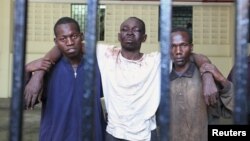NAIROBI —
Tension is high in Kenya’s coastal city of Mombasa, after police arrested the leader of a secessionist group - the Mombasa Republic Council. Local rights groups say the government's action could backfire because the secessionists are winning increasing support from people in the region.
In a dawn raid, Kenyan police arrested Omar Mwamnuadzi, the leader of the Mombasa Republic Council. Two of his bodyguards were shot dead, and police arrested 38 of his followers who were stationed around his home.
According to a regional police officer, Aggrey Adoli, the arrest of Mwamnuadzi sparked tension in the city, leading to the death of a local chief.
“The situation on the ground is that these people are real militias, because you realize that after we had arrested the chairman and the other people, some of the remnants of the MRC went for the life of a chief," said Adoli. "They went and hacked their assistant chief to death and right now we are also investigating that murder so that we can be able to arrest the culprits.”
The Mombasa Republic Council has been advocating for the secession of coastal region, an area well known for its safaris and tropical beaches.
The group bases its position on what it terms historical injustices that revolve around land and unfair distribution of national resources.
Decades of corruption in Kenya have kept the ruling elite enormously wealthy and majority appallingly poor. The country’s political volatility, highlighted by the post-election violence of 2008, gives more fuel to groups like the Mombasa Republic Council.
But the group has been associated with violence, most recently the attack on a government minister in which four people were killed, including minister’s bodyguard.
Francis Auma of Muslims for Human Rights (MUHURI) said in an interview with VOA that the government is blaming the group for all bad activities in the region.
“We [MUHURI] are not for violence. Us, we are for the legal way," Auma insisted. "If there is problem let these people be arrested and taken to court but this not MRC. Anything that happens here just normal thuggery. They say it is MRC. They are just branding."
The government has banned the Mombasa Republic Council, but in late July, three High Court judges ruled that outlawing the group was unconstitutional and said the state had failed to prove the ban was justifiable and proportionate.
The court recommended the group to register as political party since their grievances are political. But the group has refused to follow that direction.
Auma said the government wants to create fear and tension so people will be afraid of the group.
Last week, seven MRC leaders including spokesman Mohamed Mraja were arrested and charged with incitement to violence.
According to Auma, police are arresting youths and planting pamphlets, which have MRC slogans, and later charging them with incitement.
In a dawn raid, Kenyan police arrested Omar Mwamnuadzi, the leader of the Mombasa Republic Council. Two of his bodyguards were shot dead, and police arrested 38 of his followers who were stationed around his home.
According to a regional police officer, Aggrey Adoli, the arrest of Mwamnuadzi sparked tension in the city, leading to the death of a local chief.
“The situation on the ground is that these people are real militias, because you realize that after we had arrested the chairman and the other people, some of the remnants of the MRC went for the life of a chief," said Adoli. "They went and hacked their assistant chief to death and right now we are also investigating that murder so that we can be able to arrest the culprits.”
The Mombasa Republic Council has been advocating for the secession of coastal region, an area well known for its safaris and tropical beaches.
The group bases its position on what it terms historical injustices that revolve around land and unfair distribution of national resources.
Decades of corruption in Kenya have kept the ruling elite enormously wealthy and majority appallingly poor. The country’s political volatility, highlighted by the post-election violence of 2008, gives more fuel to groups like the Mombasa Republic Council.
But the group has been associated with violence, most recently the attack on a government minister in which four people were killed, including minister’s bodyguard.
Francis Auma of Muslims for Human Rights (MUHURI) said in an interview with VOA that the government is blaming the group for all bad activities in the region.
“We [MUHURI] are not for violence. Us, we are for the legal way," Auma insisted. "If there is problem let these people be arrested and taken to court but this not MRC. Anything that happens here just normal thuggery. They say it is MRC. They are just branding."
The government has banned the Mombasa Republic Council, but in late July, three High Court judges ruled that outlawing the group was unconstitutional and said the state had failed to prove the ban was justifiable and proportionate.
The court recommended the group to register as political party since their grievances are political. But the group has refused to follow that direction.
Auma said the government wants to create fear and tension so people will be afraid of the group.
Last week, seven MRC leaders including spokesman Mohamed Mraja were arrested and charged with incitement to violence.
According to Auma, police are arresting youths and planting pamphlets, which have MRC slogans, and later charging them with incitement.




